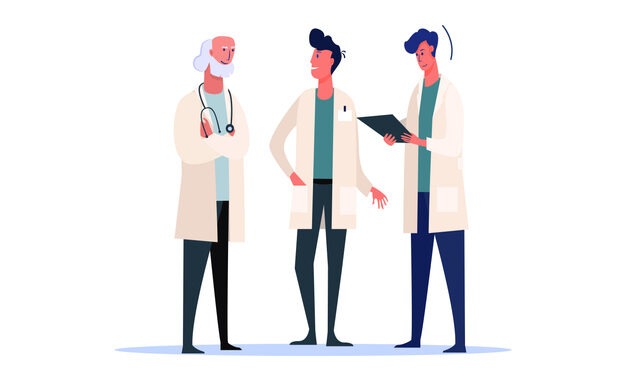
Dr Nicola Moerdyk offers 10 top tips on how to assist recently qualified GPs to develop as independent practitioners
CREDIT: This is an edited version of an article that originally appeared on Guidelines in Practice
Once upon a time, a trainee GP would apply to a variety of six-to-12-month posts that they were interested in, but a lot has changed since then. The pathway from graduation to receiving a certificate of completion of training (CCT) is far more prescriptive, and the exposure to specialties and wider medicine much more defined.
The role of the GP continues to evolve; the complexity of the conditions that patients present with is increasing, and the backlog of cases requiring consultant opinion and definitive management continues to grow, increasing the pressure on GPs. The way we work has also diversified, with the use of remote consulting by telephone, video link, and e-consults. As a result, the experiences of today’s GP trainees are different from those of the GP trainees of the past – but this does not mean that the path to becoming an independent GP is plain sailing; the jump from trainee to independent practitioner can still be daunting.
Maximise opportunities for training
Reflect on the timings of their day, the number of appointments, the number of administrative tasks, and the extras added to their lists, and compare these with those of a salaried GP or partner in the practice.
It may be tempting for trainees to leave work at 5pm having started at 9am, but this is not the reality of general practice. Likewise, the luxury of continuing with 15-minute appointments will not make for a soft landing post-CCT. Use this time judiciously, gradually rearranging their day to reflect real life – trainees should aim to work from 8am to 6.30 pm and take time back in lieu to meet contractual obligations, as agreed with the practice manager and trainer.
By the third year of their specialty training (ST3), trainees should take responsibility for the investigations they have ordered and the correspondence for the patients they have seen.
Another consideration is to develop an additional skill.
Encourage trainees to think about where they land
Everyone’s priorities are different, as are their personalities and approaches to risk. The smoothest transition may, at first glance, be achieved by staying in the familiar environment of the training practice; however, GP trainees who choose to do this face the risk that they will continue to be treated as trainees, and won’t develop as expected.
Working in one practice provides stability, allows a trainee to build relationships, and makes it easier for them to ask for support. However, trainees should be encouraged to look beyond the building and the lovely little village or market town in which the practice is situated. They should also do their homework about the practice’s reputation and try to establish how it treats its staff.
Advise trainees to form ‘support bubbles’
Just when you thought that support bubbles were a thing of the past, my third top tip is to resuscitate them. Being a GP can be tough. It can be difficult if you feel unsupported by your practice colleagues or are working in a new environment; it can be particularly isolating if you are a locum, or do a low volume of clinical sessions.
However, trainees have an established ‘support bubble’ in the form of their vocational training scheme group. How trainees choose to connect with, and establish, their bubble once they have completed their training will largely depend on legacy group dynamics, the size of their cohort, and whether their bubble communicates virtually or via face-to-face meetings. Using a group messaging app is a good way to get clarification from others quickly, and can be a useful method for exchanging ideas.
Highlight the benefits of mentoring
Trainees should be encouraged to discuss, in a confidential and informal way, their hopes and aspirations with a mentor. Mentors provide a sounding board to talk over a range of professional issues, from career progression and wellbeing to managing a tricky colleague. They can advise on navigating parental leave, dealing with a complaint and developing a role beyond clinical medicine. Most training hubs now offer a mentoring scheme, as does the Royal College of General Practitioners (RCGP). In addition, it may be helpful for trainees to identify a senior colleague in the practice who they can approach with clinical questions and concerns.
Recommend enrolling in support schemes and fellowships
NHS England has developed a two-year fellowship designed to help newly qualified GPs settle into general practice. The general practice fellowship programme aims to support all newly qualified GPs (and GP nurses) to have the best possible experience through a structured programme that includes support, networking opportunities and PCN portfolio working.
Signpost to wider support programmes
Trainees may also benefit from participation in established support schemes. The RCGP developed the First5 scheme in 2008–2009 to support newly qualified GPs from the completion of their training to five years, post-CCT. Similarly, Next Generation GP is a funded national leadership programme, designed to equip newly qualified GPs with the skills, insights and networks to succeed in the early stages of their career.
Remind trainees to prepare their paperwork
In advance of becoming an independent GP, a trainee should:
- complete the paperwork for the CCT;
- ensure that they are on the Primary Care Support England (PCSE) GP Performers List for England;
- submit a change of status.
Trainees should be advised to set time aside as they finish their training to ensure that they have filled in all of the correct forms, and should also be encouraged to think about engaging an accountant.
Prompt trainees to think about appraisal
A newly qualified GP’s first year passes quickly. Trainees should consider having an informal appraisal with their trainer before the end of ST3, in which they agree upon an interim personal development plan that will give them something to action, reflect upon and discuss with their appraiser when the time comes.
Support trainees to plan their journey
Post-assessment and newly qualified GPs should think about where they hope to be in the next five years and develop a five-year plan. There are many options available to GPs, post-CCT, both clinical and nonclinical, and often a mix of the two is possible. It can be useful for trainees to have an idea of where they want to go, whether along the traditional route of salaried GP and partnership, or whether they would prefer to build a portfolio. One of the most useful pieces of advice I was given at the end of my training was to spend the first few years honing my clinical skills and developing my confidence as a GP, and to only start to think about developing further skills once I was fully comfortable with the role. This may be something for the nearly qualified GP to reflect upon.
Promote prioritisation of emotional health and wellbeing
The COVID-19 pandemic has shone a light on the emotional health and wellbeing of the entire healthcare workforce. GPs are under significant stress due to unsustainable workloads, patient expectations and long-term underfunding. Burnout is at an all-time high. It is vital that all GPs take steps to stay well, through maintaining a good work-life balance and ensuring that they exercise, get good-quality sleep and eat well. Nearly qualified GPs should be encouraged to start fostering these habits early.


Be the first to comment